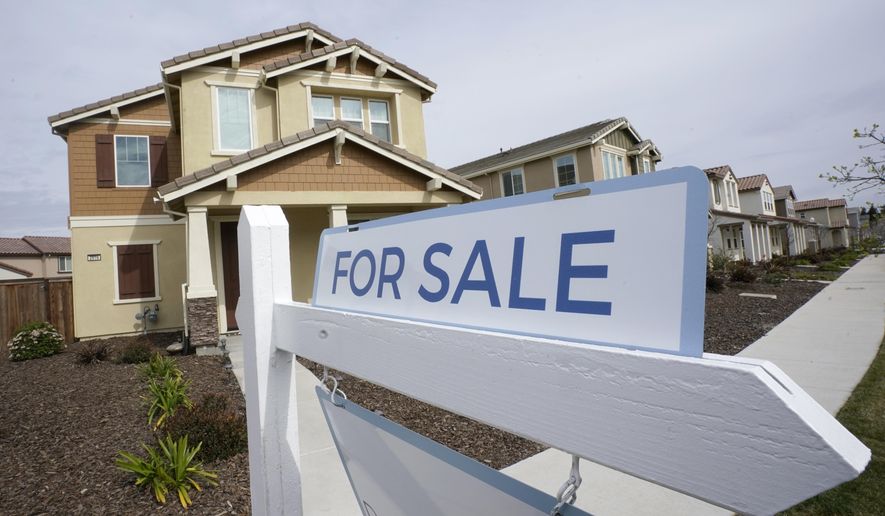House Republicans criticized a top Biden administration regulator Tuesday for burdening an already troubled housing market with a “politically driven” rule that requires some home buyers with higher credit scores to pay higher mortgage fees while giving a break to applicants with riskier credit.
Rep. French Hill of Arkansas was one of several Republicans on the House Financial Services Committee who pressed Federal Housing Finance Agency Director Sandra Thompson about the agency’s motives in implementing the new “loan level pricing adjustments” to mortgage fees through Fannie Mae and Freddie Mac on May 1.
“In too many instances, it appears that FHFA has allowed safety and soundness to take a back seat to advancing a housing agenda,” Mr. Hill told her.
Rep. Ann Wagner, Missouri Republican, said people in her district are “adamantly opposed” to the new Biden rule.
“What you’re essentially doing is taking money from those with good credit and have spent years saving for a home, and transferring it to more risky borrowers,” she told Ms. Thompson. “We all agree that there is a housing affordability problem in this country, but it won’t be solved by punishing those who play by the rules and did things right. And none of this will be solved by this unjust, socialist-style redistribution of wealth.”
Under the rule, home buyers with a good credit score over 680 pay about $40 more each month on a $400,000 loan, or more, depending on the size of the loan. The research group Evercore ISI calculated that buyers with strong credit scores, between 720 and 739, who make down payments of 15% to 20% are seeing their rates increase by 0.750%.
Conversely, borrowers with weak credit scores below 620 who borrow more than 95% of the value of their home have seen their fees drop by 1.75%.
“You can see why this would be concerning,” Rep. Frank Lucas, Oklahoma Republican, told Ms. Thompson.
Ms. Thompson defended the FHFA’s updated fee “grid,” saying the new pricing reflects “the cost of capital and other administrative expenses.” She said the fees had not been updated in a decade, and rejected the assertion that high-credit borrowers were being forced to subsidize home buyers with riskier credit.
“Under the new pricing framework, borrowers with strong credit profiles are not being penalized to benefit borrowers with weaker credit profiles. That is simply not true,” Ms. Thompson said. “Borrowers with lower credit scores, and lower down payments will continue to pay higher overall mortgage costs than borrowers with higher credit scores and higher down payments.”
Democrats on the committee also backed the administration’s changes, saying the moves are intended to bring more fairness to the housing market. Rep. Maxine Waters, California Democrat, said the FHFA “took a step in the right direction” by ensuring lower-income borrowers “are not unfairly penalized.”
“Unfortunately, Republicans are continuing to spread misinformation about the new pricing framework and regurgitating alternative facts about what this actually means for borrowers,” Ms. Waters said.
Rep. Warren Davidson, Ohio Republican, said the updated policy “comes at a critical time as consumers are struggling with inflation, much of which can be attributed to high housing costs.”
“The Federal Housing Finance Agency may not be the most well-known agency for average Americans, but your credit score redistribution plan has captured everyone’s attention,” Mr. Davidson told Ms. Thompson.
The changes come at a turbulent time in the housing market. Mortgage rates have roughly doubled since early 2022 as the Federal Reserve has imposed a rapid series of increases in interest rates to fight historically high inflation.
The rate for a 30-year fixed mortgage averaged 6.35% last week.
Only 21% of U.S. adults believe it is a good time to buy a house, down 9 percentage points from the prior low recorded last year, according to Gallup’s annual Economy and Personal Finance poll conducted April 3-25. In the survey, 78% of respondents said it is a bad time to buy a house.
The poll results of the last two years are the only time since Gallup started asking the question in 1978 that less than half of Americans believe it’s a good time to buy a home.
“In the past two years, as housing prices have soared and the Federal Reserve has raised interest rates to try to tame inflation, houses have become less affordable for many Americans, and views of the housing market have tumbled,” the Gallup report said. “Opinions of the housing market are bleak and generally similar among all major subgroups, including by region, urbanicity, homeownership status, income, education and party identification.”
The FHFA reversed course earlier this month on a similar plan to impose new mortgage fees based on a borrower’s debt-to-income ratio.
Homebuyers getting loans through Fannie Mae or Freddie Mac were facing a new fee of 0.375% on Aug. 1 if their house payment and other debts were more than 40% of their monthly gross income. After hearing an outcry from realtors and others in the mortgage industry, Ms. Thompson said the agency “will provide additional transparency on the process for setting … single-family guarantee fees and will request public input on this issue.”
Correction: An earlier version of this article gave the incorrect state of Rep. Frank Lucas of Oklahoma.
• Dave Boyer can be reached at dboyer@washingtontimes.com.




Please read our comment policy before commenting.